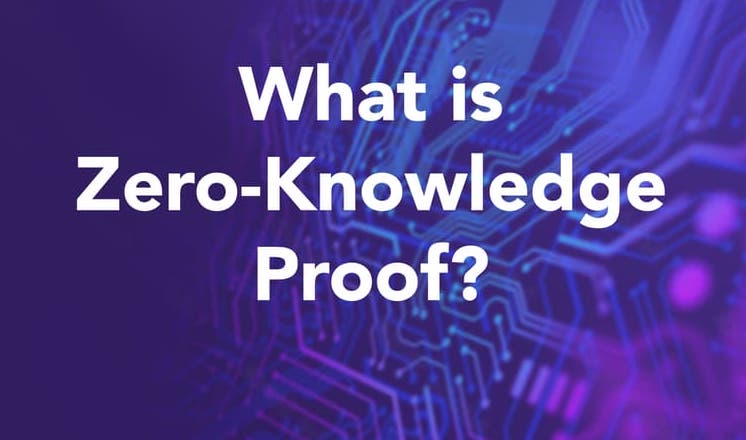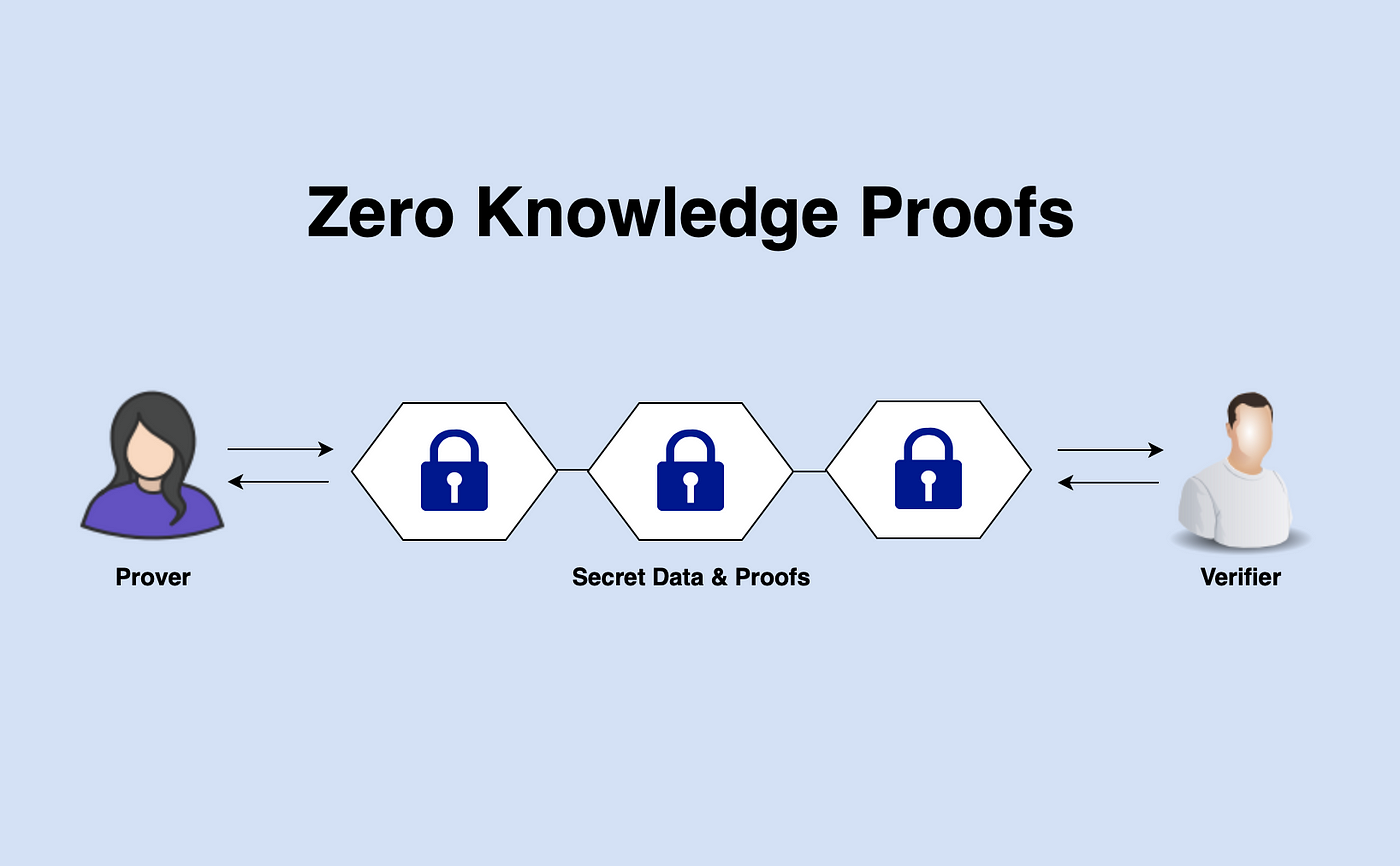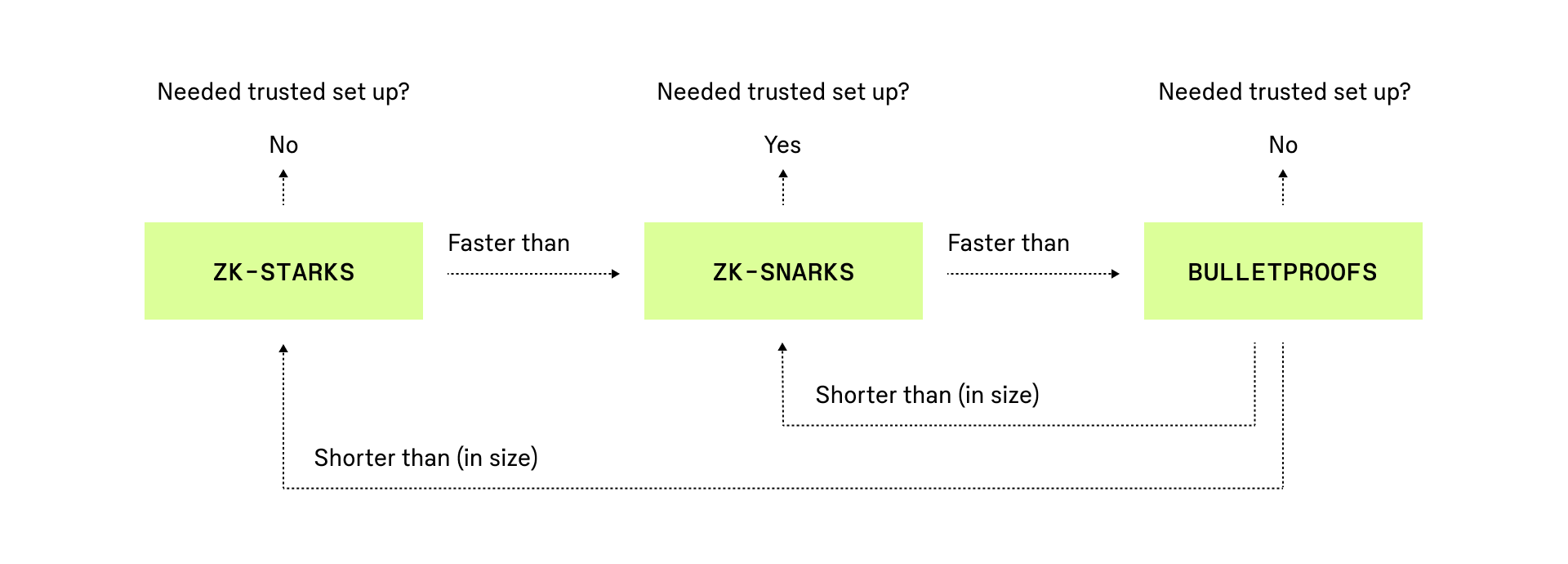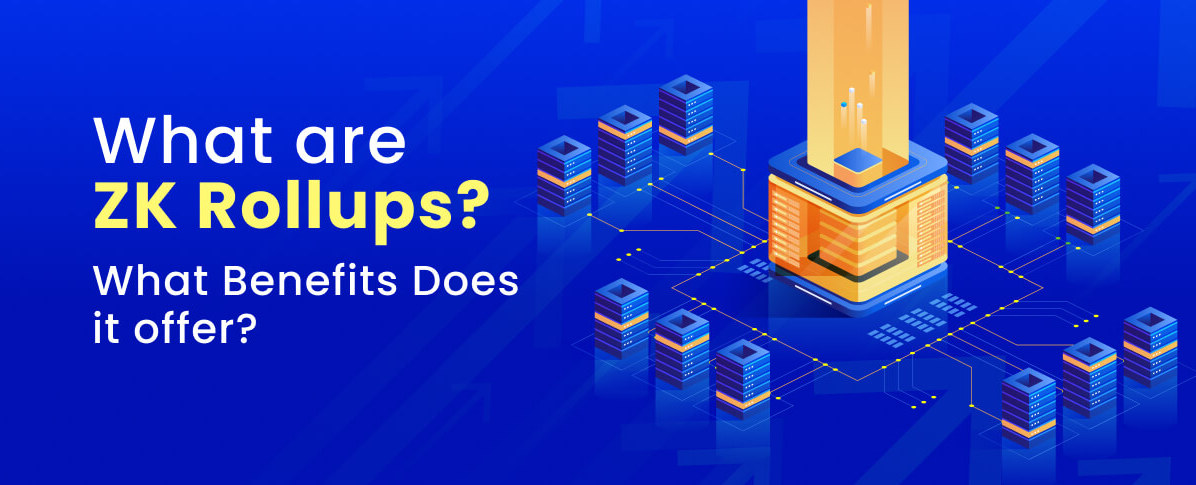What is Zero Knowledge Proof and its role in blockchain?
 Mukesh Godara
Mukesh GodaraTable of contents
- What Are Zero-Knowledge Proofs (ZKPs)?
- How Do ZKPs Work?
- Types of Zero-Knowledge Proofs
- Benefits of ZKPs
- Zero-Knowledge Rollups (ZK Rollups)
- What Are the Benefits of ZK Rollups?
- Zero-Knowledge Use Cases in Blockchain Technology
- Mainstream Applications for ZKPs
- Crypto Projects Using Zero Knowledge Technologies
- Conclusion

Have you ever wondered how you could prove something without revealing any extra information? Enter the world of zero-knowledge proofs (ZKPs), a fascinating cryptographic concept transforming our thoughts about privacy and security, especially in blockchain technology.
What Are Zero-Knowledge Proofs (ZKPs)?
Zero-knowledge proofs (ZKPs) are cryptographic protocols that allow one party to prove a statement's truth to another without revealing extra information. They play a vital role in blockchain technology by verifying transactions or data without disclosing sensitive details, crucial for maintaining trust and confidentiality in decentralized systems.
In blockchain and Web3, ZKPs strike a balance between privacy and transparency. For instance, imagine proving you know something without revealing the details—like showing your ID to enter a club without disclosing your address. That's the essence of ZKPs, providing robust security while safeguarding sensitive information.
How Do ZKPs Work?
The magic of ZKPs lies in their ability to validate data without sharing it. They employ mathematical algorithms where a prover convinces a verifier of a fact without revealing the underlying details. For example, in cryptocurrency transactions, ZKPs validate transaction legitimacy without exposing amounts or involved parties. This is achieved through complex cryptographic techniques like "witness" and "challenge-response" protocols.

Let's understand it through real-life based example:
Imagine you have a special cookie jar that only opens with a secret password. Your friend wants to know the password, but you want to prove to them that you know it without actually telling them what it is.
Here's how you can explain zero-knowledge proofs using this cookie jar:
The Secret Cookie Jar:
- You have a cookie jar that can only be opened with a secret password. Inside, there's a special cookie your friend wants to see.
Proving Your Knowledge:
You tell your friend, "I know the password to open the cookie jar."
Your friend asks you to prove it, but you don't want to reveal the password because it's a secret.
Cookie Jar Magic:
You take the cookie jar and perform a magic trick: you can shake the jar in a specific way that only someone who knows the password can replicate.
Each time your friend asks, you shake the jar in the correct sequence to prove you know the password.
Conclusion:
After several demonstrations, your friend is convinced that you really do know the password without ever seeing it themselves.
They haven't learned the password, but they trust that you know it because of how you can shake the jar in the correct sequence each time.
Explanation:
Cookie Jar: Represents the concept of zero-knowledge, where you prove your knowledge (knowing the password) without revealing the actual password itself.
Shaking the Jar: Demonstrates how you can perform a specific action (shaking the jar in a secret sequence) that shows your knowledge of the password in a way that doesn't give away the password itself.
Trust and Proof: Your friend trusts you know the password because of your ability to perform the secret action consistently, similar to how zero-knowledge proofs work in cryptography.
Types of Zero-Knowledge Proofs

Different types of ZKPs offer varying trade-offs in proof size, processing time, and security assurances:
zk-SNARKs (Zero-Knowledge Succinct Non-Interactive Argument of Knowledge): Compact proofs suitable for verifying computations on blockchain networks with minimal computational overhead. For instance, projects like Zcash utilize zk-SNARKs to enable private transactions without revealing transaction details.
zk-STARKs (Zero-Knowledge Scalable Transparent Argument of Knowledge): Provide efficient and transparent proofs for verifying complex computations without requiring interaction between prover and verifier. Platforms like StarkWare leverage zk-STARKs for scalable blockchain solutions, ensuring privacy and integrity in decentralized applications.
Bulletproofs: Compact, non-interactive zero-knowledge proofs that require no trusted setup, making them ideal for verifying range proofs and transaction validity in cryptocurrencies. Projects like Monero integrate Bulletproofs to enhance transaction privacy and efficiency in blockchain networks.
PLONK (Permutations over Lagrange-bases for Oecumenical Noninteractive arguments of Knowledge): Universal zero-knowledge proofs that support complex computations and large-scale applications, ensuring secure and efficient validation of blockchain transactions and smart contract executions.
Benefits of ZKPs
Enhanced Privacy: ZKPs allow proving possession of information or task completion without revealing underlying details, protecting sensitive data like transaction amounts, sender/receiver identities, and voting choices in DAOs.
Boosted Security: ZKPs verify complex computations' validity without trusting the source, strengthening blockchain security by reducing intermediaries and potential attack vectors.
Improved Efficiency: ZKPs streamline processes by verifying intricate calculations more efficiently than traditional methods, benefiting areas such as supply chain management and fraud detection.
Zero-Knowledge Rollups (ZK Rollups)

ZK Rollups represent a revolutionary leap in blockchain scalability and privacy, showcasing one of the most compelling uses of zero-knowledge encryption in blockchain technology. Instead of congesting the main blockchain with every transaction, ZK Rollups aggregate hundreds or thousands of transactions into a single "rollup." The twist? They prove, via clever cryptography known as ZKPs, the validity of all transactions without revealing sensitive details—akin to showing your ID to enter a club without disclosing your address.
For instance, ZK Rollups significantly enhance Ethereum's transaction throughput by processing multiple transactions off-chain and submitting a single proof to the mainnet afterward. This approach reduces network load, boosts transaction speeds, and enhances efficiency, potentially enabling Ethereum to handle millions of transactions per second.
What Are the Benefits of ZK Rollups?
Zero-Knowledge (ZK) Rollups are reshaping the blockchain landscape by offering enhancements in transaction speed, scalability, privacy, and cost-effectiveness while preserving decentralization principles. Here's a closer look at their multifaceted benefits:
Blazing-Fast Transactions: By moving transactions off-chain, ZK Rollups reduce fees and transaction times, making cryptocurrency trading more seamless and affordable.
Enhanced Scalability: ZK Rollups pave the way for blockchains capable of processing millions of transactions per second, fostering widespread adoption and maximizing blockchain potential.
Boosted Privacy: ZKPs within ZK Rollups maintain transaction privacy, protecting user anonymity and building trust in financial systems.
Preserved Decentralization: ZK Rollups uphold blockchain decentralization by only submitting proofs to the main chain, ensuring transparency and trust while optimizing efficiency.
Reduced Fees: Off-chain transaction processing naturally lowers fees, making blockchain interactions more accessible and cost-effective for all users.
Zero-Knowledge Use Cases in Blockchain Technology
Scalable Blockchains
ZKPs empower Layer-2 solutions like ZK Rollups to bundle transactions into single proofs, improving scalability and privacy by validating transactions without exposing details. Technologies like zk-SNARKs and zk-STARKs enhance transaction throughput and privacy, pivotal in decentralized finance and enterprise applications.
Example: In the finance sector, ZK Rollups enhance DeFi platforms like Aave by processing numerous transactions off-chain and submitting one proof to Ethereum. This reduces gas fees and congestion while preserving user privacy, encouraging wider adoption of decentralized financial services.
Data Integrity Verification
ZKPs can prove data integrity without downloading entire files, streamlining processes and conserving resources. For example, ZKPs verify valid credentials (e.g., driver's license) without disclosing the document, enhancing privacy in verification processes.
Example: Governments can use ZKPs to verify citizens' identities for digital services without storing personal data on centralized servers, reducing identity theft risks while maintaining service efficiency.
Decentralized Oracles
In blockchain ecosystems, ZKPs enhance decentralized oracles like Chainlink by ensuring data accuracy without revealing sensitive information. They safeguard privacy, validate data integrity, and prevent fraud, crucial for regulatory compliance and user trust.
Example: Chainlink's DECO protocol uses ZKPs to verify data integrity from off-chain sources, ensuring reliable real-world data for smart contracts without exposing source information. This secures financial transactions and IoT applications while maintaining privacy.
Secure Multi-Party Computation (MPC)
Collaborate on computations without revealing individual inputs, facilitating privacy-preserving applications in AI and machine learning.
Example: Medical research institutions can use ZKPs to analyze patient data collaboratively without sharing confidential health records, ensuring privacy compliance and accelerating medical breakthroughs.
Digital Rights Management (DRM)
Control access to copyrighted content without invasive copy protection measures, preserving content creators' rights and user privacy.
Example: Streaming platforms use ZKPs to verify user licenses for accessing premium content, preventing piracy while protecting user data from unauthorized access.
Secure Messaging
Send confidential messages with end-to-end encryption, ensuring message integrity and confidentiality in communications.
Example: Messaging apps integrate ZKPs to encrypt user conversations, preventing unauthorized access and ensuring private communication channels.
Fairness in Online Gaming
ZKPs can verify game fairness without disclosing game logic or algorithm details, enhancing trust in online gaming platforms.
Example: Gaming platforms use ZKPs to prove fair distribution of rewards without revealing game mechanics, ensuring a transparent and equitable gaming experience for players.
Verification of NFT Ownership
Authenticate ownership and originality of NFTs without revealing owner identity, safeguarding intellectual property and buyer privacy.
Example: Artists use ZKPs to verify NFT ownership on blockchain platforms, ensuring transparency and authenticity while protecting personal information.
Mainstream Applications for ZKPs
Beyond specialized domains, ZKPs find practical applications in:
Financial Transactions: Enable anonymous payments without revealing financial details, enhancing transaction privacy in cryptocurrencies like Zcash.
Medical Records: Securely share necessary medical information while preserving patient privacy and complying with regulations like HIPAA.
Voting Systems: Verify votes without compromising voter anonymity or integrity, ensuring fair and transparent elections.
Supply Chain Management (SCM): Prove product authenticity and origin in supply chains without exposing sensitive commercial information.
Credit Scoring: Validate credit eligibility without disclosing financial specifics, enhancing privacy and financial inclusion.
Confidential Access to Public Records: Provide secure access to public records without compromising sensitive information security.
Passwordless Authentication: Authenticate users without vulnerable password-based systems, ensuring secure and seamless access.
Crypto Projects Using Zero Knowledge Technologies
Zcash
Zcash is a prominent example of a cryptocurrency utilizing zero-knowledge proofs (zk-SNARKs) to enhance transaction privacy. By allowing users to conduct shielded transactions, Zcash ensures that transaction amounts, sender/receiver addresses, and transaction metadata remain confidential on the blockchain. This privacy feature enables secure and anonymous transactions, preserving user financial privacy while maintaining blockchain transparency.
Loopring
Loopring is a decentralized exchange protocol leveraging zero-knowledge rollups (ZK Rollups) to enhance transaction scalability and privacy. By aggregating multiple transactions off-chain and submitting a single proof to the Ethereum mainnet, Loopring achieves high throughput and low transaction costs. This approach not only improves transaction efficiency but also ensures user privacy by maintaining transaction details off-chain, enhancing the overall trading experience in decentralized finance (DeFi).
StarkWare
StarkWare utilizes zero-knowledge proofs (zk-STARKs) to develop scalable blockchain solutions, including zero-knowledge rollups and verifiable computation. By validating complex computations off-chain without revealing sensitive data, StarkWare enhances blockchain scalability and privacy, enabling secure and efficient decentralized applications (dApps) and financial transactions. StarkWare's innovative use of zk-STARKs promotes blockchain adoption by improving transaction throughput, reducing transaction costs, and preserving user privacy in decentralized ecosystems.
zkSync
zkSync is a Layer 2 scaling solution for Ethereum utilizing zero-knowledge rollups (ZK Rollups) to enhance transaction scalability and privacy. By processing transactions off-chain and submitting a single proof to the Ethereum mainnet, zkSync significantly reduces transaction costs and latency while maintaining transaction privacy. This approach makes zkSync suitable for high-frequency transactions and decentralized applications (dApps), promoting Ethereum's adoption as a scalable blockchain platform.
Conclusion
Zero-knowledge proofs (ZKPs) revolutionize blockchain technology by offering unparalleled privacy, security, and scalability across various applications. From enabling private transactions and verifiable computations to enhancing decentralized identity and securing decentralized oracle networks, ZKPs empower blockchain ecosystems with robust cryptographic solutions. As blockchain adoption accelerates, ZKPs will continue to play a pivotal role in safeguarding user privacy, validating data integrity, and fostering innovation in decentralized systems.
Subscribe to my newsletter
Read articles from Mukesh Godara directly inside your inbox. Subscribe to the newsletter, and don't miss out.
Written by
